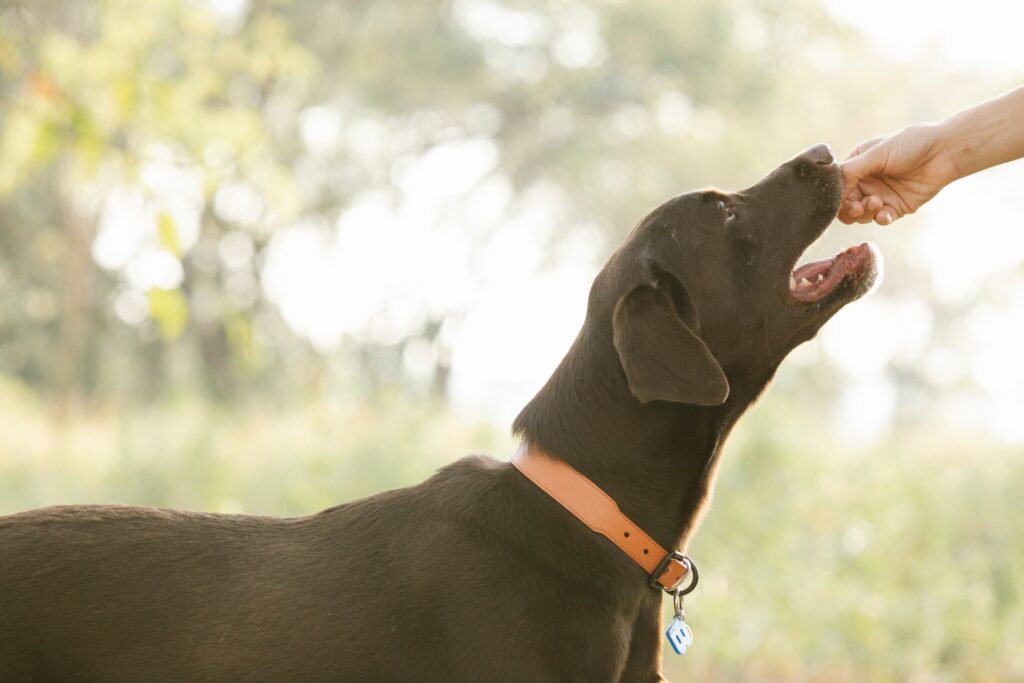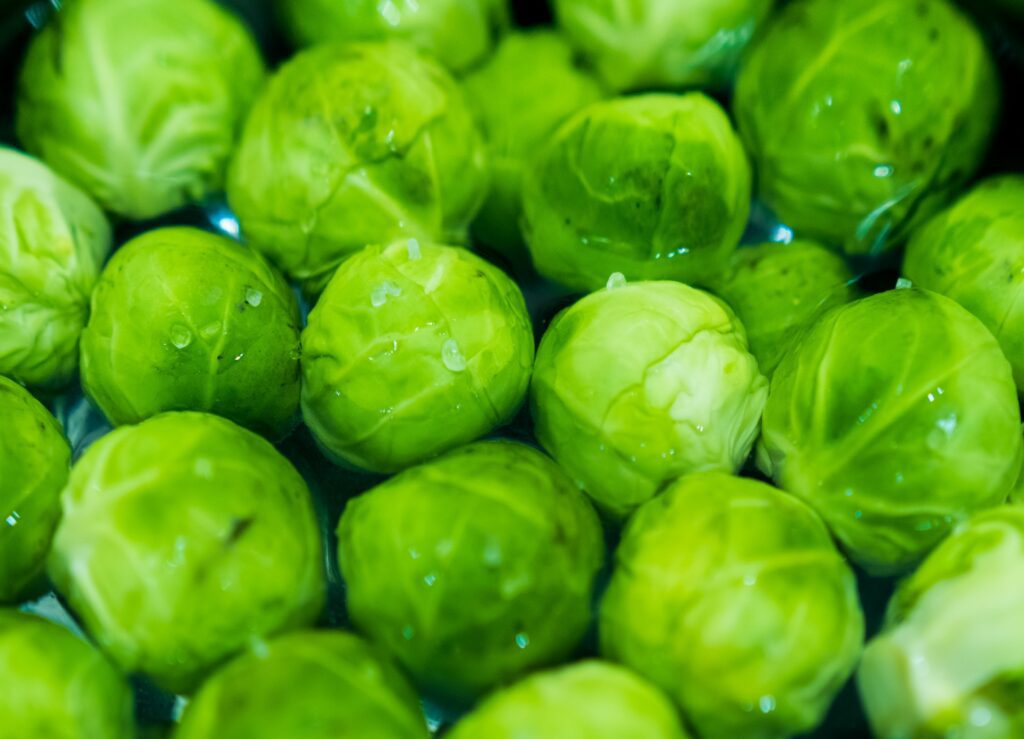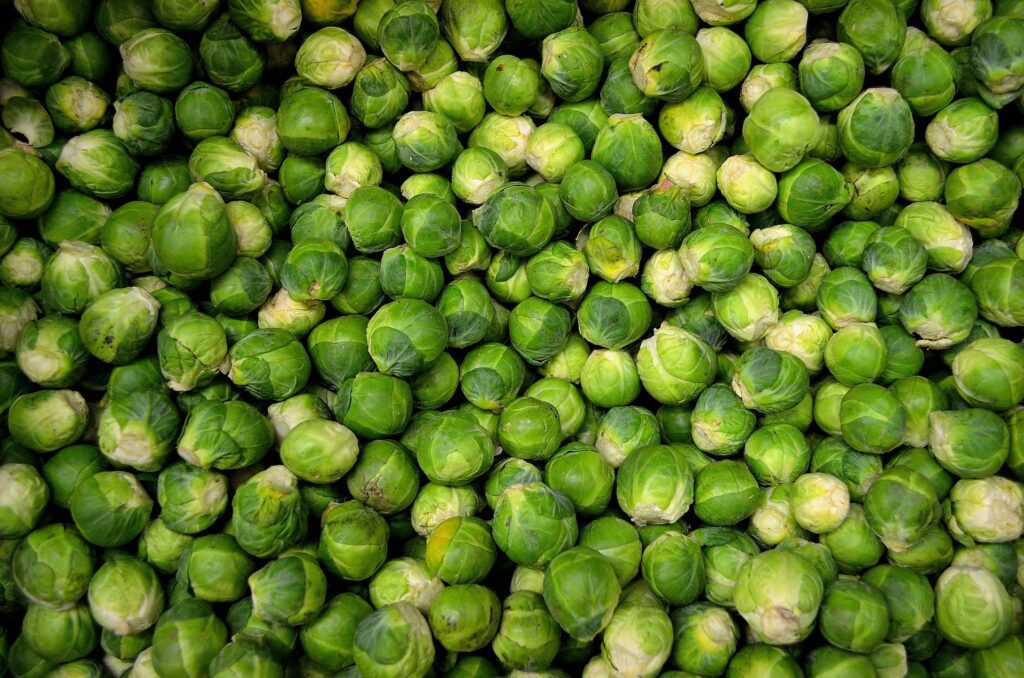It’s difficult not to melt into a puddle when your dog makes his best “please share with me” face while you’re eating brussels sprouts. You might be tempted to throw one to him, but can dogs eat brussels sprouts?
Brussels sprouts seem to be one of those foods that people either love or hate. If you’re in the former camp, you may be tempted to share some sprouts with your dog. But is it safe? The answer is yes, with a few precautions.
Table of Contents
You may be interested : Can dogs eat olives? Are Olives Safe for Dogs?

Can dogs eat brussels sprouts?
Yes! Your dogs can eat brussels sprouts. They are the kind of vegetable your dog’s diet shouldn’t be lacking in. Brussels sprouts are a nutrient-dense vegetable with several benefits for human and animal health. They contain a variety of vitamins and minerals and are high in fiber. For instance, brussels sprouts contain large amounts of vitamins C and K. These vitamins are renowned for enhancing the immune system and helping to develop strong, healthy bones. A great vegetable to add to your dog’s diet is this one. Due to its high nutritional value, it is a crucial component of your puppies’ and senior dogs’ diets.
The Dangers of Feeding Brussels Sprouts to Your Dog
Brussels sprouts contain isothiocyanates, as do all vegetables in the cruciferous family. These phytonutrients are advantageous because they aid in the movement of food and waste through the digestive tract. They do, however, produce an excess of bacteria, which are tiny organisms that aid in the fermentation process of digestion.
These tiny organisms produce a lot of gas, which is how the body gets rid of excess bacteria. If your dog consumes an excessive amount of Brussels sprouts, you may need to open the windows to rid the house of stinky dog farts. Aside from that, Brussels sprout stalks are fibrous and tough. They can cause intestinal blockages or impaction problems in your dog and pose a choking hazard. However, if the outer skin of the stalk is removed, it is relatively safe for your dog to eat. If the leaves are chopped and cooked, they are also edible.
Brussels sprouts are difficult to digest raw. If you feed them raw, your dog’s digestive system will struggle to process the fiber. This could result in gastrointestinal distress, bloating, or diarrhea.

Can dogs eat raw brussels sprouts?
The answer is no, dogs shouldn’t consume raw brussels sprouts, including the leaves, stalks, and sprouts themselves. Any of these raw foods will be too taxing on your dog’s digestive system and will cause serious digestion problems. How often can dogs eat brussels sprouts?
Can dogs eat brussels sprouts safely?
Not at all! When considering their nutritional profile, Brussels sprouts are very beneficial for dogs (same as with humans, actually). Active components that will improve your dog’s health include:
- Antioxidants
- Vitamin K
- Vitamin E
- Vitamins A, C, B1, and B6
- Dietary fiber
- Kaempferol
- Low calories
- Lowers Blood Sugar Levels
Brussels sprouts are a member of the cruciferous vegetable family and are high in glucosinolates, which are known to prevent cancer. This vegetable, like broccoli and cabbage, contains specific chemicals that help them fight cancer so successfully. Additionally, Brussels sprouts reduce insulin resistance, making them beneficial for diabetics. This is because Brussels sprouts’ fiber and antioxidants fight the effects of insulin resistance. Additionally beneficial to bone health, it facilitates calcium absorption and guards against tooth decay thanks to its antibacterial properties.
Antioxidants
These tiny green vegetables contain a significant amount of antioxidants that will help your dog’s inflammation by reducing it. Additionally, they’ll aid in bettering blood circulation!
Vitamin K
When it comes to vitamins, this is a vitamin powerhouse. It will help maintain a regular blood clotting rate, as well as promote strong bones and improve your dog’s heart health.
Vitamin E
A lack of vitamin E has been linked to issues with vision, loss of body movement, and muscle weakness, according to studies. Maintaining immune system health and the health of the skin and coat are both benefits of vitamin E!
Vitamins A, C, B1, And B6
Your dog’s entire body and the system will feel a lot better with a nice blend of your regular vitamins! This is fantastic if our dog’s regular diet is deficient in those minerals and vitamins as well.
- Vitamin C, which is great for your dog’s immune system and overall health, is abundant in Brussels sprouts. Additionally, vitamin C is known to support the cardiovascular health of your dog.
- Vitamin A benefits the entire family and aids in the vision and reproductive health of your dog.
- When it comes to preventing mental decline with age and treating seizures, vitamin B1 excels.
- Your dog’s brain will function better thanks to vitamin B6, which is a great nutrient for cognitive function. They can also assist in controlling hunger and energy levels.
Vitamins are wonderful. And it’s even better if you can eat all of them at once, like in brussels sprouts.
Dietary Fiber
This unusual fiber will facilitate regular bowel movements in your dog. It’s much simpler for dogs to use the bathroom when they need to because it’s great for softening and adding weight to it!
A strong anti-inflammatory, kaempferol. It is so effective that it can be prescribed to treat degenerative conditions in various body parts of your dog, including the intervertebral disc.
Additionally, kaempferol aids in the prevention of chronic illnesses like cancer.
Low Calories
Brussels sprouts are a healthy addition to your dog’s diet because they have few calories. With the aid of these tiny vegetables, they can have the healthiest diet imaginable without having to be concerned about overeating and putting on weight.
Lowers Blood Sugar Levels
Brussels sprouts can help dogs with diabetes lower their blood sugar levels. This is a fantastic way for your dog to lead a healthy lifestyle without having the additional concern that restricting carbohydrates might endanger them. But brussels sprouts also have a slightly runny side effect; more on that later!

How to Give Your Dog Brussels Sprouts
Always consult your veterinarian before introducing new foods to your dog. Your vet is familiar with your dog’s health and can advise you on how to feed a specific food to your dog. When shopping for Brussels sprouts, look for green sprouts that are organic (if possible) and have no wilted or brown leaves. Give your dog fresh sprouts because old ones can cause watery stools. Remove the stem from your Brussels sprouts and wash them to remove any pesticides or chemicals that could upset your dog’s stomach.
Brussels sprouts are easiest to digest when steamed, boiled, or microwaved. Steaming is the best way to preserve the nutritional value and antioxidant properties of your sprouts. The worst method is to boil them because the nutrients will leach out into the water, depriving the Brussels sprouts of their nutritional value. Because many dogs gulp their food, frozen Brussels sprouts may pose a choking hazard. It is best to serve cooked Brussels sprouts to them.
Any additional seasonings or oils will upset your dog’s stomach and may lead to pancreatitis or worse. As tasty as onions, garlic, or salt are to us, they are toxic to your dog. Avoid using oils or butter on your dog’s digestive system, and instead, serve unseasoned Brussels sprouts with no oils.
The amount of Brussels sprouts your dog can eat is determined by its size. Small dogs can easily consume one sprout, while larger dogs can consume up to five. Consult your veterinarian to determine the appropriate amount to feed your four-legged friend without causing stinky sprout gas! When feeding your dog for the first time, only give them 14 to 12 sprouts. Keep an eye out for signs of discomfort or gas, which will appear in a few hours or less. Contact your veterinarian if you experience any discomfort other than smelly gas.
Follow the 90/10 rule when feeding your dog anything other than their regular dog food. Balanced dog food should provide 90% of your dog’s calories, with healthy treats providing the remaining 10%.
Can dogs eat brussels sprouts cooked?
The answer is yes. Make sure to cook Brussels sprouts in the safest manner when giving them to your dog. This suggests that the sprouts should be thoroughly cleaned before cooking.
Getting Ready and Serving
Steamed, boiled, or microwaved Brussels sprouts are the best options for your dog. The most amount of nutrients is preserved during steaming. Start off with a firm, green sprouts. After giving them a thorough wash, trim off the majority of the stem, leaving the leaves alone. Five minutes of steaming or up to eight minutes in the microwave with water. Boiling requires more time—about 10 minutes—and retains fewer nutrients. They shouldn’t be served raw because your dog won’t be able to digest them. Also, omit spices and herbs.
Feeding your dog Brussels sprouts without first consulting your veterinarian is not advised if they have any allergies or dietary restrictions. If your dog is given the all-clear to eat this vegetable, start out by giving them a small serving—between 1/2 and 1 sprout, depending on the size of your dog. If all goes well, you could occasionally give them a Brussels sprout treat—no more than three per serving. Prepare some for yourself while you’re at it. They’re beneficial to you!
Final thought can dogs eat brussels sprouts?
Dogs seem to enjoy the healthy, low-calorie treat of Brussels sprouts. Brussels sprouts are a tasty addition to your dog’s dinner bowl as long as you’re serving them plain, fresh, and cooked sprouts. If properly prepared and given in moderation, these cruciferous vegetables can even be beneficial for overweight or diabetic dogs.
Related articles :
Can dogs eat cucumbers? Are cucumber seeds safe for dogs?
Can Dogs Eat Pork? When Is Pork Bad For Dogs? what should I do?